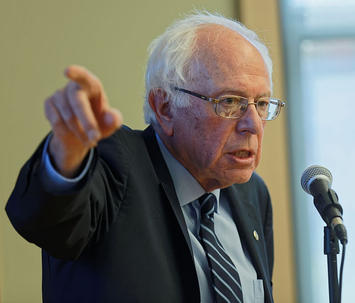
The mainstream media are having a field day, and rightfully so, chronicling the meltdown of the once-formidable Republican Party. Less focus has been placed on what may be equally, or greater, divisions emerging among Democrats, both in California and around the country.
The largest gap within the party was revealed recently in Orange County, where Bernie Sanders denounced the Walt Disney Co. for paying “starvation wages” to most of its workers while rewarding the CEO with $46 million this year. To Sanders supporters, Disney is a clear “class enemy,” but to Hillary Clinton, the Disney brass represent a source of campaign cash, part of the fairly uniform support for her among establishment Democrats across the board.
Increasingly, the Democratic Party is divided between two elements of its coalition – an oligarchy that supports Clinton and a base of workers, many of them younger, who favor Sanders. To the Clintonites, her positions on gay rights, the environment and feminism make her an acceptable progressive. However, to those who back Bernie, her embrace of, and by, the oligarchs, amid rising economic inequality, represents a glaring contradiction with someone supposedly leading “the party of the people.”
Corporate Liberalism vs. Social Democracy
Clinton’s ascendency reflects the gentrification of the Democratic Party. Since the 1990s, argues historian Michael Lind, the Democrats have evolved from the party of the people to become, increasingly, an instrument of those in media, technology, entertainment and finance who dominate our post-industrial economy. In contrast, Republicans, increasingly isolated from these rising corporate powers, are being forced, often unwillingly, to become the party of populist American nationalism.
Certainly, Clinton, more than any other candidate in modern times, symbolizes the convergence of economic and political power. She enjoys across-the-board support from Hollywood, Silicon Valley, Washington’s K Street lobbyists and Wall Street. Clinton also personally collected a cool $21 million in speaking fees from a host of powerful Wall Street financial and other big corporate interests during 2013-15. She certainly appears like a future president bought and paid for.
Read the entire piece at the Orange County Register.
Joel Kotkin is executive editor of NewGeography.com. He is the Roger Hobbs Distinguished Fellow in Urban Studies at Chapman University and executive director of the Houston-based Center for Opportunity Urbanism. His newest book, The Human City: Urbanism for the rest of us, will be published in April by Agate. He is also author of The New Class Conflict, The City: A Global History, and The Next Hundred Million: America in 2050. He lives in Orange County, CA.
Photo by Michael Vadon (Own work) [CC BY-SA 4.0], via Wikimedia Commons












